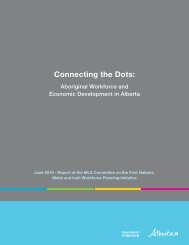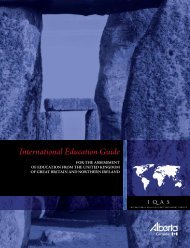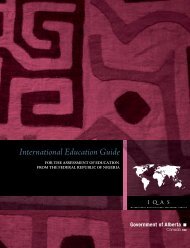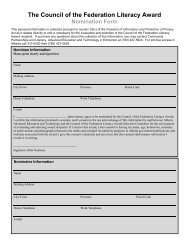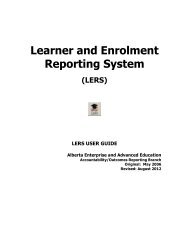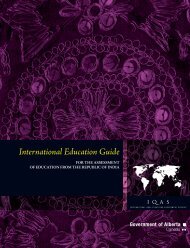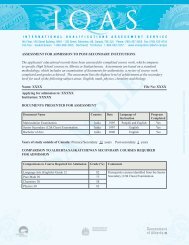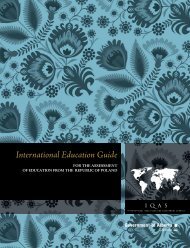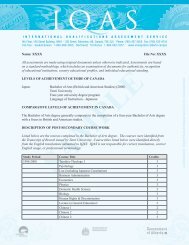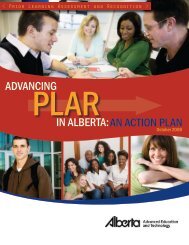International Education Guide - Enterprise and Advanced Education ...
International Education Guide - Enterprise and Advanced Education ...
International Education Guide - Enterprise and Advanced Education ...
Create successful ePaper yourself
Turn your PDF publications into a flip-book with our unique Google optimized e-Paper software.
.66<br />
INTERNATIONAL EDUCATION GUIDE for the assessment of education from the Islamic Republic of Pakistan<br />
Appendix A—Placement Recommendations<br />
Placement recommendations provide guidelines for<br />
comparing international <strong>and</strong> Canadian educational<br />
credentials <strong>and</strong> st<strong>and</strong>ards. These recommendations are<br />
advisory in nature <strong>and</strong> indicate the general level of a<br />
credential in Canadian terms.<br />
Placement recommendations represent benchmark<br />
assessments <strong>and</strong> do not cover all credentials. However, the<br />
fact that a credential is not mentioned in the placement<br />
recommendations does not mean it cannot be assessed by<br />
IQAS. <strong>International</strong> credentials not specifically covered<br />
should be referred to IQAS for individual evaluation.<br />
When evaluating international credentials IQAS considers<br />
the following:<br />
• the education system of the country concerned<br />
• the recognition of the awarding institution<br />
• the level, length <strong>and</strong> structure of the program<br />
When appropriate IQAS may<br />
• consider that comparison to a different level of<br />
education may more accurately reflect the level of the<br />
international credential in Canadian terms<br />
• combine two or more credentials<br />
Given the different educational philosophies, objectives<br />
<strong>and</strong> program structures in educational systems around the<br />
world, evaluation in terms of direct equivalence to specific<br />
Canadian credentials is not possible. For this reason IQAS<br />
placement recommendations are made in terms of “generally<br />
compares” to <strong>and</strong> not “equivalent” to.<br />
Credential Name<br />
IQAS Recommendations<br />
Secondary School Certificate Generally compares to the completion of Grade 10.<br />
Higher Secondary Certificate Generally compares to the completion of Grade 12.<br />
Diploma of Associate Engineer<br />
Bachelor’s (Pass) degree (2-year)<br />
Bachelor’s (Honours) degree (3-year)<br />
Bachelor’s (Honours) degree (4- or 5-year)<br />
Bachelor of Technology (Pass) degree<br />
(one year of academic study)<br />
Bachelor of Technology (Pass) degree<br />
(two years of academic study)<br />
Bachelor of Technology (Honours) degree<br />
(two years of academic study in total)<br />
Bachelor of Technology (Honours) degree<br />
(three or more years of academic study in total)<br />
Bachelor of <strong>Education</strong> (BEd) (1-year)<br />
Bachelor of <strong>Education</strong> (BEd)<br />
(3-year integrated program)<br />
Bachelor of <strong>Education</strong> (BEd)<br />
(4-year upgraded program)<br />
Bachelor of Law(s) (LLB)<br />
(2-year) [prior to 1992]<br />
Generally compares to the completion of a post-secondary certificate.<br />
Note: the first two years of the program are considered to be at a secondary level <strong>and</strong> the<br />
completion of Grade 12 is acknowledged.<br />
Generally compares to the completion of two years of undergraduate study.<br />
Generally compares to the completion of a three-year bachelor’s degree.<br />
Generally compares to the completion of a four-year bachelor’s degree.<br />
Generally compares to the completion of a post-secondary diploma.<br />
Generally compares to the completion of a three-year post-secondary diploma.<br />
Generally compares to the completion of a three-year post-secondary diploma.<br />
Note: In combination with the Bachelor of Technology (Pass) degree.<br />
Generally compares to the completion of an applied bachelor’s degree.<br />
Note: In combination with the Bachelor of Technology (Pass) degree.<br />
Generally compares to the completion of one year of undergraduate study in education.<br />
Generally compares to the completion of a three-year bachelor’s degree with a focus in education.<br />
Generally compares to the completion of a four-year Bachelor of <strong>Education</strong> degree.<br />
Generally compares to the completion of two years of undergraduate study in law (as practiced in<br />
the Islamic Republic of Pakistan).




